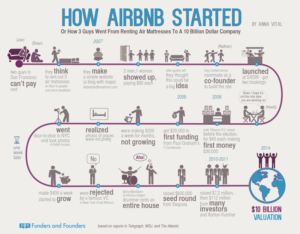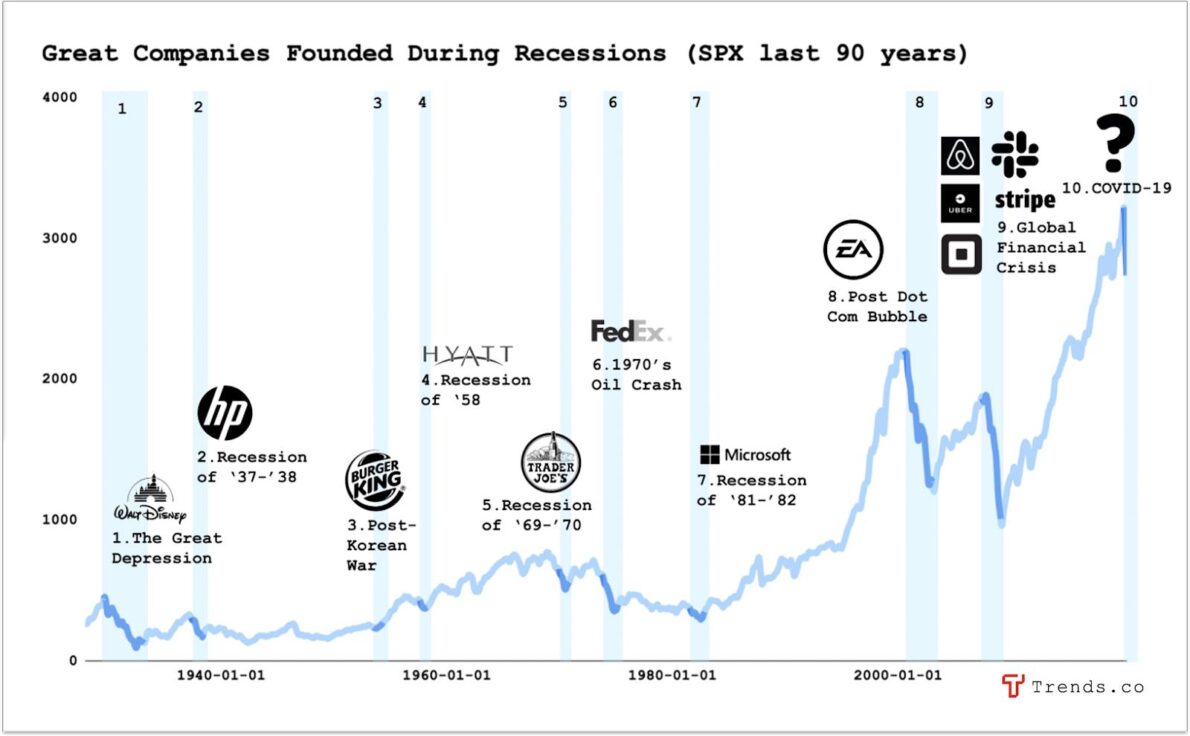Why now is the best time ever to launch your business?
In the current situation, in order to provide a way out of the crisis, companies are looking for new development paths and are working to increase their efficiency. We decided to study the experience of international brands and collect several cases of well-known companies that had not only survived the crisis, but also got out of it with great advantages over competitors.
Since the beginning of the century, workflow automation has helped businesses grow.
The easiest way to create a useful product is to automate part of the manual routine. This provides a stable demand and an initial source of financing.
In 2000, Ben Chestnut, co-founder and CEO of Mailchimp, ran a design consulting studio. They created a web design agency called the Rocket Science Group. Their attention was focused on large corporate clients, but, on the other hand, they created an amazing email marketing tool for small businesses.
So in this way, MailChimp was born, and in 2017, the company was gaining 14,000 new customers every day, reaching an annual revenue of $700 million in 2019.
What happens to startups during the economic downturn? Do they have a chance?
The International Monetary Fund forecasts that in 2020, no less deep recession is expected than during the global financial crisis of 2008-2009. Entrepreneur Richard Lew studied statistics and found that the future of startups is not as pessimistic as it might seem at a first glance
It seems logical that during a recession, it will be more difficult for startups to find financing, especially at early stages. However, statistics show that the number of transactions with business angels and investors aimed at working with start-up companies during the crisis of 2008-2009 remained stable and even grew (see the dark blue line on the chart).

Early-stage startups survive and succeed
During a recession, startups apart from having difficulties, have also some advantages such as:
- Companies with good financing get a chance to buy competitors;
- Office rental and travel expenses are reduced;
- Representatives of certain types of businesses are expanding their presence in the market.
It is worth noticing that part of the startups that appeared during the recession of 2008-2009 became unicorns.
2008:
- Airbnb (private, valuation for 2019 – $ 38 billion)
- Pinterest (public, October 2019 valuation – $ 14 billion)
- Cloudera (public, October 2019 valuation – $ 2.5 billion)
- Beats (in May 2014 was bought by Apple for $ 3 billion)
- Yammer (in July 2012 was bought by Microsoft for $ 1.2 billion)
2009:
- Uber (public, October 2019 valuation – $ 54.6 billion)
- Square (public, October 2019 valuation – $ 26.9 billion)
- Slack (public, October 2019 valuation – $ 12.5 billion)
- Nutanix (public, October 2019 valuation – $ 4.9 billion)
Let’s look at a few stories in more detail.
FedEx
The 1970s oil crisis hit the automotive and aircraft industries particularly hard. The Organization of Arab Petroleum Exporting Countries (OAPEC) members refused to supply oil to countries supporting Israel which was in a conflict with Syria and Egypt. The embargo affected Western Europe and the United States.
Oil prices soared four times. President Nixon called upon the Americans to save money: people were encouraged to drive less often, and airlines were encouraged to reduce the number of flights.
It was in such difficult conditions, that Federal Express was born – “a new airline designed only for parcels.” Its founder – Fred Smith came up with the concept of express delivery over long distances while he was still at university – he devoted one of his term papers to this topic, for which, by the way, he was given the top three. Smith believed that in the modern world, time plays a much greater role than money. The cargo delivery system of that time worked slowly and inefficiently, as only several companies shared the entire cycle. Smith decided that the “door to door” responsibility for the parcel should be taken by a single company.
The first three years of operation saw the company lose money despite having the highest finance as a new company in US history in terms of venture capital. The problem was that FedEx positioned itself simply as a more secure delivery service, without focusing on speed. In 1975, Smith dramatically changed his marketing strategy – now FedEx only handled urgent orders, “which needed to be delivered yesterday.” It was not until 1976 that the company saw its first profit of $3.6 million based on handling 19,000 packages a day.
How Airbnb turned renting air mattresses in their apartment into a $31 billion company
The Airbnb founder story is one of the most inspiring stories of the 21st century.
In 2008, when it all started, the creators of Airbnb, Brian Cesky and Joe Gebbia, were barely making ends meet. To scrape up money for rental housing, they allowed strangers to spend a night on air mattresses in their apartment. That is what prompted them to the idea of a new business. People have to pay homeowners around the world for overnight stays. What is worth adding is the fact that at first, the largest investors in Silicon Valley were fully convinced about the failure of this concept.
Here’s how they turned their idea of renting an air mattress into a business that has scared the hotel industry.

Source: https://airbnb370.wordpress.com/history-of-airbnb/
SUMMARY
Of course, all the mentioned examples are large leading companies in their industries with a strong business model, managerial and financial resources, and other advantages that not everyone possesses. But it was not always so. These are very vivid stories that provoke a broader look at the current situation (and not just to concentrate on cost optimization).
Perhaps new possibilities are beginning to open before your company, and now is the time to notice and take advantage of them. We are super curious about how the current situation will impact the digital and IT world. Feel free to share your thoughts, Damian Winkowski will be happy to discuss it (damian.winkowski@leocode.com).
In the meantime, you can check out some of our earlier stories about companies we love: Slack, Skype or Whatsapp


